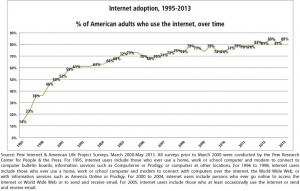The Digital Divide in the U.S. – 60 million Americans don’t use the Internet
The digital divide in the U.S.: Nearly 20 per hundred of U.S. mature individuals don’t use the Internet. That entails that approximately 60 million persons, numerous of them aged, poor and minorities, have no access to technology most people increasingly consider mission-critical to modern life.
The New York Times’ had an intriguing story on that occurrence, which lays out some of the programs policymakers have endeavoured to use to get persons online. But who are these 60 million persons not online and are they offline by alternative or circumstance?
Internet adoption has more or less flatlined in latest years, as asserted by facts and numbers from the Pew Internet and American Life Project. As of the center’s last survey in May, somewhere between 81 and 85 per hundred of U.S. mature individuals were online. The number with household Internet access is notably lower — about 72 out of 100, as showed by the Census Bureau.
Demographically the persons on the offline edge of the digital divide are likely who you’d expect. Wealthier persons have more Internet than poor people; penetration is smallest amidst mature individuals older than 65.
But there are in addition some perturbing racial divergences that worry academics and politicians. While Internet use more than doubled in Hispanic and black families since 2000, they still lag notably behind white and Asian families – who, at 82.7%, have the utmost Internet use of any studied group.
What are the reasons for persons not going online? The June report on America’s “Emerging Online Experience” from the Department of Commerce tries to answer these questions. Intriguingly, the bureau discovered that half of offline families easily don’t desire Internet — they either feel they don’t require it, they can use it in another location, or it infringes on their privacy. For the residual non-users, the biggest factor is cost.
Statistically, although, most persons are incorrect when they state they don’t require the Internet. Per the Commerce Department, Internet use has a discernable influence on paid work, earnings, consumer welfare and civic engagement. So concluding the digital divide would not only advantage persons on the wrong side of it, but furthermore the financial and civic society as a whole.









Leave a Reply
Want to join the discussion?Feel free to contribute!